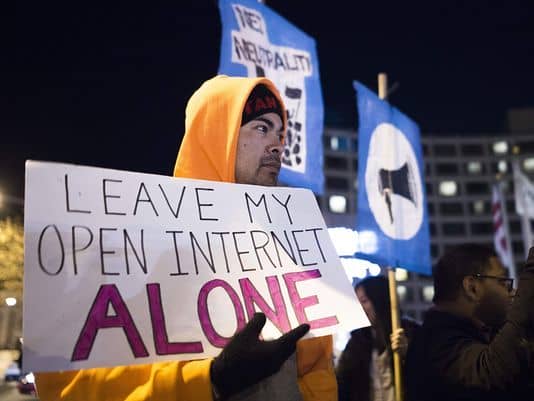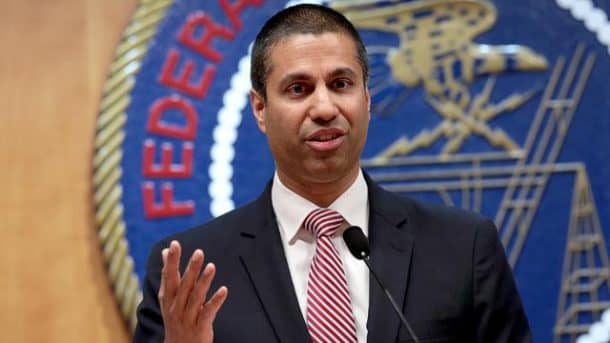Dozens of sites across the internet are participating in an online protest today. With pop-ups and banners, web’s most prominent players are pushing their visitors and customers to call out to Congress to save the net neutrality. It is a tactic that brought success once before and helped to save the net from the scourge of SOPA in 2012 and defended net neutrality in 2014. But today’s protests are comparatively last minute and dire. Just 48 hours before the FCC will announce the plan to repeal net neutrality protection on Thursday, 14th December 2017, which appears to be proceeding without any hurdle. The fundamental nature of the internet is destined to change and not for the better.
“Break the Internet” has rallied online giants like Reddit, Mozilla, Cloudflare, Pinterest and Github to its cause. The organizers have given instructions to rank-and-file web users to join the protest by screaming with hashtags or by using Facebook’s algorithm to announce their upcoming marriage to net neutrality. Clever!
All this comes just a week after nationwide, real protestors saw demonstrators gather outside local Verizon stores to object to the telecom giant’s influence and specifically to its alumnus Ajit Pai, the FCC chairman, who will be presiding over the net neutrality repeal.
There is a chance that all this hollering could lead to a stay of execution as it did in 2014. The decision ultimately belongs to the FCC and the commission that has already tipped its hand. Congress has historically shown reluctance to wade into the issue and recently sided with big telecom on the matter of your privacy, not to mention lawmakers have plenty of other things to worry about. Still, two representatives are speaking out though neither of their attempts did much to stall the imminent FCC vote.

So how will the internet look like if the worst comes to pass?
According to the FCC, we’ll see more investment in the web. This argument is doubtful, however. Telcos, meanwhile promise to keep the business, as usual, no blocking, no throttling, and no funny business. However, the industry is working to repeal anything that holds them to those standards and ignoring their own previous attempts at exactly the sort of behavior that net neutrality prohibits.
Despite the terrifying versions of tiered internet services similar to television cable packages, the future of a non-neutral internet could be oppressive in more covert ways. if you do not currently have a data cap on your home connection, you should be wise enough to get one. Any data rationing would stage for what we have already seen from cellular providers unburdened by the net neutrality, an exception is to rule for certain services that pay for the privilege, or that your ISP prefers for whatever self-interested reason. This preferential treatment, in turn, can be presented as an improvement over draconian caps. But it is also just a watered-down version of what used to be normal and what may quickly fade from memory.
The concentration of power around already established service providers brings all sorts of problems even with net neutrality in place. Facebook plays with publishers for access to their followers while allowing advertisers to promote fake news everywhere. Google features search results that highlight false information as its online shopping results face anti-trust penalties in the EU. Twitter’s de facto online public square has abuse policies that enforce a flagrant double standard and are suspiciously friendly to actual, Nazis.

“Platform creep” that has congealed the open web around these increasingly powerful corporate fiefdoms has been building for years already. On a neutral internet, where there is a foundational presumption of equality between services big and small, these challenges could be surmountable with a one-two punch of trust-busting and innovation. But a non-neutral internet threatens to gently and firmly close the door by giving incumbents a permanent leg up. The repeal of net neutrality is not something that will immediately and clearly shatter the web, but it is more of an installation of a lens that will focus and intensify the internet’s worst qualities. The end of net neutrality could start a slide that there’s no coming back from.
The overwhelming cost of a non-neutral internet may not be what we lose, but what we fail to gain. In a moment where the giants of the internet are shuddering under their own weight and virtually every combination of cable companies have either merged or attempted to the repeal of net neutrality, lends all parties involved in the ability to leverage their power into more power. Even in the face of user’s general distaste and a hunger for alternatives, attempts to upset the stale status quo will almost assuredly become more difficult.
Ultimately, the path we go down will be decided for us on Thursday, and the resulting effects may prove tough to pin down precisely. Let’s just hope that, years from now, we won’t have to merely remember when the internet was good.


